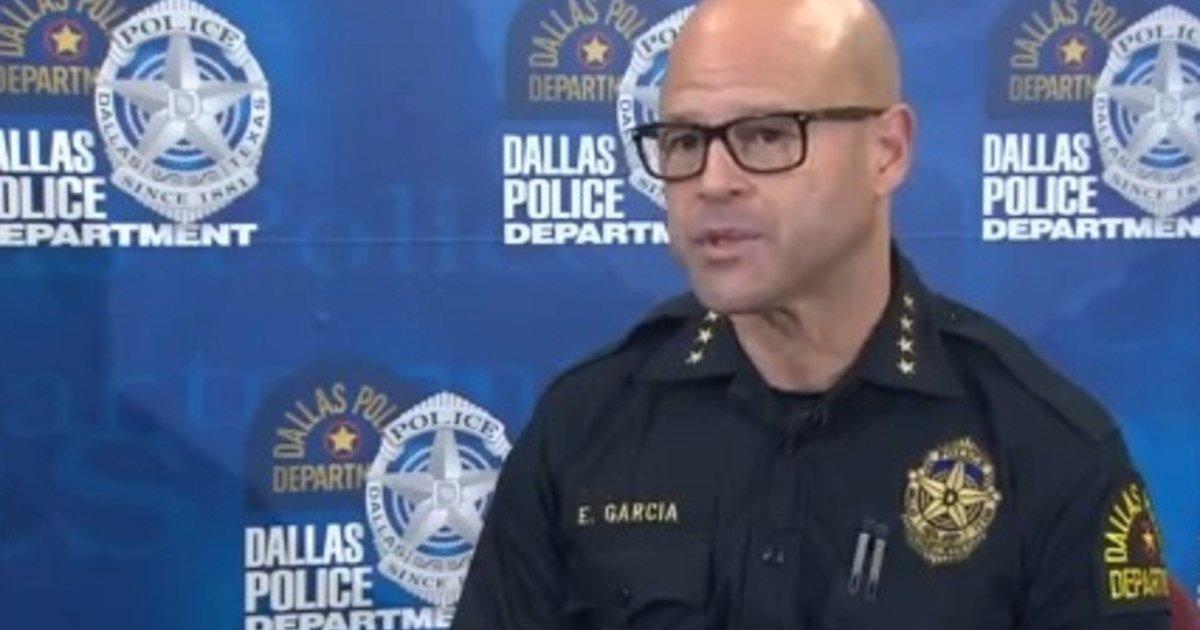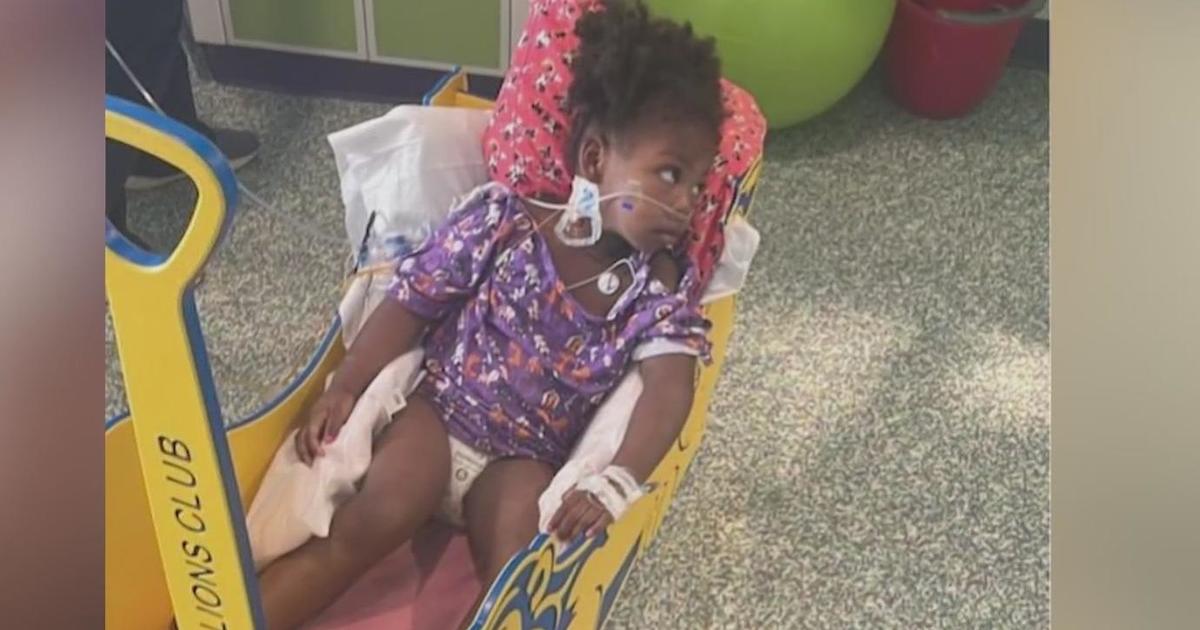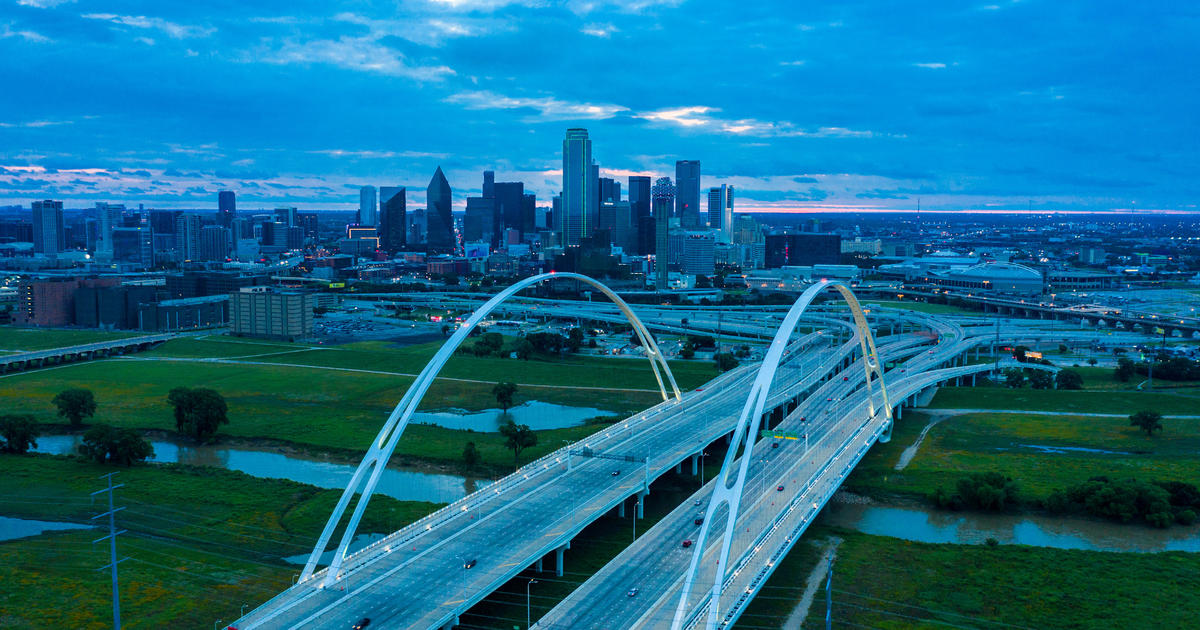Violent crime drops further after second year of Dallas Police Department's violent crime reduction plan
DALLAS (CBSNewsTexas.com) — New statistics from the Dallas Police Department show violent crime fell in targeted hot spots during the second year of its violent crime reduction plan.
Police Chief Eddie Garcia and Mayor Eric Johnson spoke with CBS News Texas about the plan during a joint exclusive interview.
Some residents said the city's program has helped make a life-changing difference for their family.
Danuel and Jasmine Rodgers said it used to be that even something as simple as cooking in their kitchen could stir up fear. "You never know when a bullet is going to come through the window or when they're out here fighting, like right out here in front and everybody's got guns."
Up until this time last year, the couple said fighting and gunfire reverberated through their apartment complex, shattering their sense of safety and that of their 10 and 12-year-old sons.
Jasmine Rodgers said their children would ask, "Mom, why are they shooting?"
Her husband shared that he'd tell his boys to get on the floor "because you don't know where bullets go. Bullets don't have a name."
Their complex, the Volara Apartments along E. Overton Road in east Oak Cliff, was once a violent crime haven.
"Out of 101,000 grids we have in the City of Dallas, this was the number one crime grid we had," Chief Garcia said.
That was two years ago, when the city began implementing its plan. And it's now in its third year.
DPD has been working with the University of Texas at San Antonio and criminologist Michael Smith, and has divided the city into more than 101,000 grids, each one 330 feet by 330 feet.
The department focuses on the most violent 50 to 65 grids at a time for about 60 days, and they change based on current data. Aside from the Volara Apartments, the city doesn't reveal to the public its grids or the specific areas it focuses on. It uses a hot spot policing strategy, featuring officer visibility and intelligence to turn around communities like the Volara Apartments.
Though taking more than a year's time, the complex has been off the hot spot list for months and has stayed off.
"It's a testament to the community, it's a testament to the city, it's a testament to the men and women who've been down here," Chief Garcia said.
Mayor Johnson said growing up, he lived in about half-a-dozen apartment complexes similar to Volara. "I know what it's like to be a kid growing up in a neighborhood like this—in an apartment complex just like this—hearing gun shots, having people you know directly impacted by crime."
DPD has been targeting violent street crime, specifically aggravated assaults (non-family violence), robberies and homicides.
In its first year of the program, violent crime in the city's targeted hot spot grids dropped by 11% from the months before the program.
Chief Garcia said after the second year, the results have gotten better. "The grids are down approximately 31% in violent crime and, again, these were our most violent neighborhoods."
According to the chief, the violent crime from the grids has not spread, and in areas immediately surrounding the hot spots, violent crime fell by 9%.
City records show between Jan. 1 and Aug. 12 of this year, robberies city-wide were down by more than 10% from the same period last year.
Aggravated assaults (non-family violence) dropped by nearly 15% from the year before, during the same period this year when compared to last.
However, homicides increased from a year earlier by more than 6%.
When asked how he explained that, Chief Garcia said, "The way the crime reduction strategy works is to reduce gun-related aggravated assaults, that's the number one tell of violence in the city. One life is too many, but we jump to the murder number often without looking at the cause. The cause of those murders is with gun-related aggravated assault. By reducing incidents, we will reduce that number. The randomness of some of the murders and the fact, quite frankly, is many of our victims are involved in criminal activity that puts them in the wrong place at the wrong time."
Hot spot policing isn't new, but Chief Garcia said what's different in Dallas is they're using an all-inclusive strategy with various approaches to reduce violent crime. "The officers are visible, they're making contacts, they're talking to people. Not just in a moment of crisis, just being present and that's made a tremendous amount of difference."
Mayor Johnson said, "It's also why this isn't stop and frisk. Let's be real about this: stop and frisk was a policy that was about indiscriminately stopping people that fit a certain profile just because they fit a profile. So, if you were African-American, you were getting stopped and patted down and that's not what this is all about at all."
Recently, the department began a third phase of the program called "focused deterrence," of which Garcia said law enforcement officers, federal and Dallas County prosecutors reach out to a group of repeat violent offenders and give them a choice. They'll face increased prosecutions if they continue committing crimes or they can receive job training, education, mental health and substance abuse counseling if they change their ways.
"These individuals that have been involved in violence, we want them to get out because it behooves us all for them to get out of that life and to take the olive branch that we're giving them. But with the message, 'Don't mistake kindness for weakness,' because we're not going to tolerate violent crime," the chief said.
Ultimately, Mayor Johnson said he doesn't want there to be a part of the city where people don't want to be in after dark or live. "These communities deserve to be as safe as any other. That's what this is really about. It's prioritizing the places that are having the toughest time with violent crime and giving them the treatment that they need to get them off the list."
The city has also hired violence interrupters to work with residents in the hot spot areas to help support the department's violent crime reduction plan.
Both the mayor and chief said they, along with council members, City Manager T.C. Broadnax, and other city leaders are committed to DPD's plan because they believe it will help them achieve their goal of making Dallas the safest largest city in the United States.
Back at Volara, managers have fixed the gates to keep criminals out and are in the process of renovating the apartments inside and out.
They have also evicted residents who cause problems.
Residents like the Rodgers give the managers here, Maribel Macias and Yaneli Gomez, and Dallas police credit for the transformation. A transformation they said has changed their lives and the lives of their children.
"They play outside all day now. We let them go to the J.C. Phelps Center, we let them walk back and come straight here and their friends come knock on the door and they go play with them for a little bit. They deserve to live a good, peaceful life like any other child would want to live."




